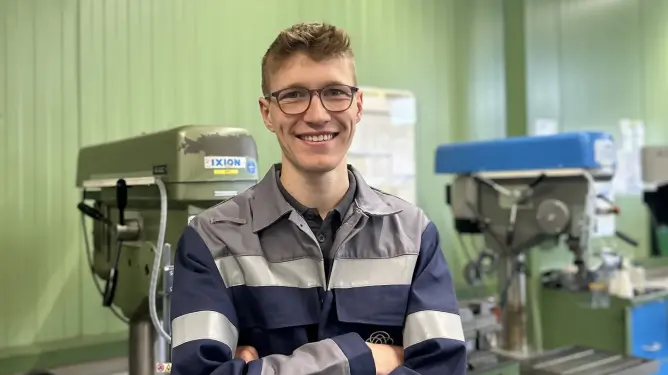Who are you and what do you do at thyssenkrupp Steel?
My name is Elias Mayer, I'm 20 years old and I'm currently in the second year of my apprenticeship as a mechatronics technician. In the first year of my apprenticeship, I applied to study alongside my apprenticeship at thyssenkrupp Steel and to join the Young Potential Program. This means that I am completing a dual course of study alongside my apprenticeship and am currently pursuing my bachelor's degree in industrial engineering.
This requires a lot of time and discipline, but I still find space for my hobbies, such as playing soccer and spending time with friends.
How did you come to thyssenkrupp Steel?
After thinking long and hard about whether I should start an apprenticeship straight after leaving school or go to university, I finally decided to do an apprenticeship at thyssenkrupp Steel. Why exactly? I was looking for an attractive employer that is not only known for its current standing, but also makes an active contribution to the green transformation - and that's exactly what I found at thyssenkrupp Steel. What finally convinced me was the fact that thyssenkrupp Steel made the decision between training and studying/further training easier for me. Instead, the company offered an ideal combination of a high-quality apprenticeship and ongoing training opportunities. After starting my apprenticeship, I then applied internally for a study grant and was accepted into the Young Potential Program.
What does a typical training day currently look like for you?
My working day at thyssenkrupp Steel always starts at 6 a.m. in the technical center or at the vocational school. I'm currently completing the last courses at the technical center before I start working in the company. In these courses, my colleagues and I learn everything we need to know for the skilled worker exam, as well as all the skills that will be required later as a skilled worker. This includes, for example, operating lathes and milling machines, on which we occasionally manufacture components. But repairing gearboxes, programming and simulating technical systems, as well as setting up and wiring control cabinets are also part of our daily routine.
Although we have a rough plan every day of what to expect in the current training course, spontaneous assignments from our trainers ensure that every day remains varied. We also take part in regular safety training to ensure the safety of everyone at work. After my working day, which ends around 2 pm, I usually enjoy some free time or prepare for the lectures I attend three times a week from 6 pm to 9 pm at the FOM.
What have you enjoyed most about your apprenticeship so far?
I particularly enjoy working in a team with my colleagues to develop solutions to problems that initially seem difficult. We often come up with different approaches and ideas, but we usually achieve a good result together. This happens on a daily basis, even with small problems, when we think about the sequence in which we have to choose the production steps in order to manufacture a workpiece. But we also work together on larger projects in different courses that have to be planned and implemented together. For example, we recently programmed a control system for a ski lift together and then simulated it together.
How does the Young Potential Program work?
To become part of the Young Potential Program, you must first apply internally for the study sponsorship during your apprenticeship. If your application is successful, you will then attend a selection day where you explain your motivation for studying and introduce yourself in person. If you are then accepted, you can start studying at a college or university alongside your apprenticeship. In my case, I study part-time at the FOM, so twice a week after work and on Saturdays. The company supports me financially during my studies and training, for example by paying my tuition fees. As a program participant, you also benefit from the conditions of the collective agreement for dual students, including learning material allowances and study days before exams. You also have the opportunity to have regular feedback meetings and network with other students, which is very helpful. The exchange with colleagues who have already completed the program, as well as tips for everyday student life and the balance between work and study, are a great help. Meetings, such as factory tours, are always a highlight, as they strengthen the community and provide a framework for an open exchange.
What were your highlights in the Young Potential program?
My highlight so far was definitely the factory tour in Duisburg, followed by a meal together. During the tour, I once again realized how big the company is and the countless opportunities it offers. At the same time, the challenges on the path to green transformation also became clear.
During the subsequent meal, we had the opportunity to get to know each other better and exchange ideas. It was particularly interesting to see how we all come from different backgrounds and yet have a common goal. This get-together was definitely a highlight, as we were able to exchange ideas with colleagues who have similar experiences. That's why I'm already looking forward to our next meeting in the summer, when we'll be visiting the Meiderich ironworks together.
What makes you representative of #nextgenerationsteel?
I think the desire and ambition to be part of the change at thyssenkrupp Steel towards more sustainable and efficient steel production, even if it comes with challenges, is crucial. Equally important is the willingness, like many of my colleagues, to do a lot for this change and to do my best to contribute to it.
Openness to exchange ideas is of great importance here, as each colleague comes from a different background and therefore contributes their own ideas, which are often helpful.




